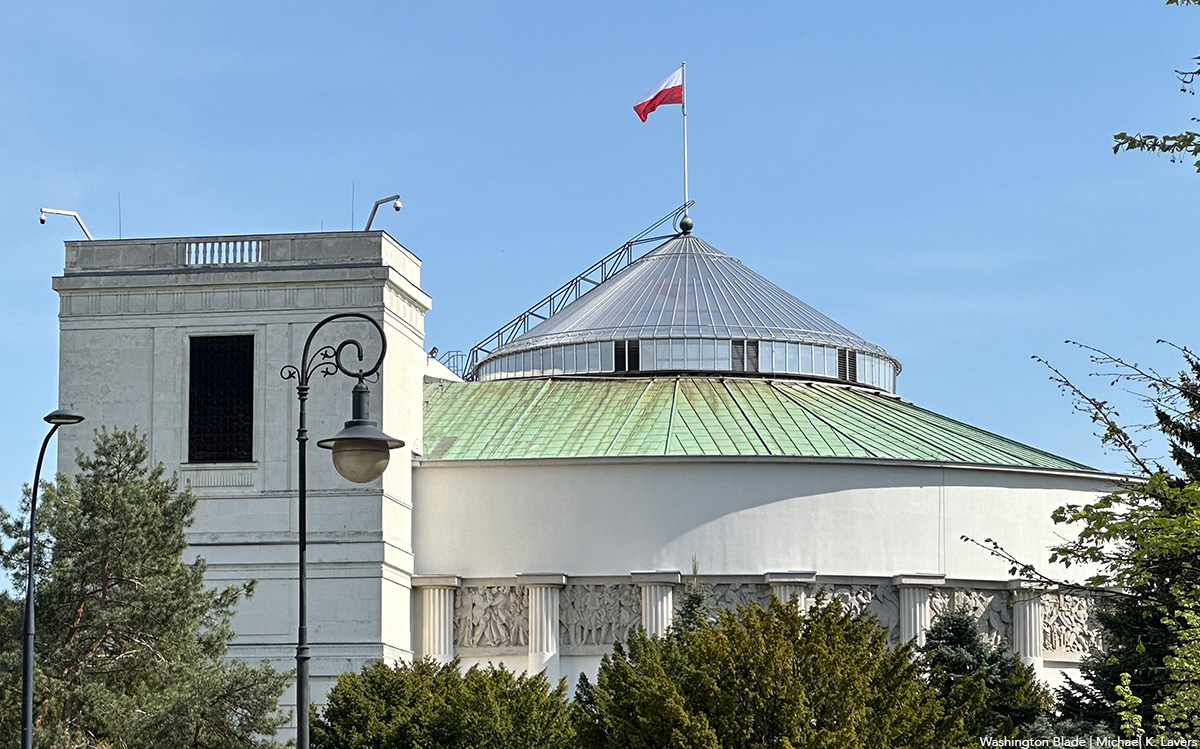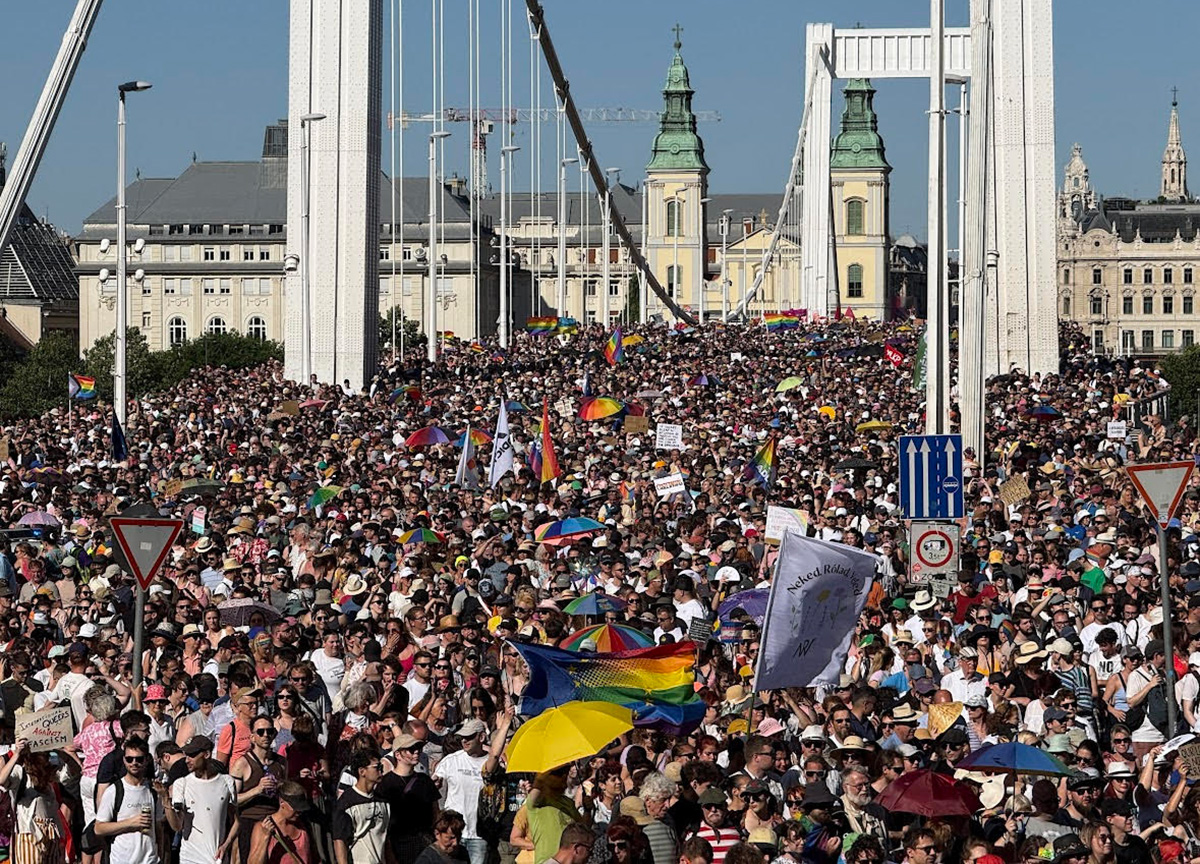World
Out in the World: LGBTQ news from Europe, Australia, and Canada
Italian lawmakers have passed a bill to ban overseas surrogacy

ITALY
The Italian Senate gave final passage to Prime Minister Giorgia Meloni’s bill to ban criminalize the use of surrogacy overseas, in what LGBTQ activists are saying is a direct attack on same-sex parents.
Surrogacy is already illegal in Italy. The new law cracks down on parents who travel out of the country to obtain surrogacy services where it is legal, like the U.S. or Canada. Under the new law, such parents could be subject to fines of up to €1 million (approximately $1.1 million) or imprisonment for up to two years.
While the vast majority of Italians who engage in overseas surrogacy are heterosexual couples, activists fear the law will be used specifically to target male same-sex couples, who cannot simply pretend not to have used a surrogate.
That would fit with a pattern of attacking same-sex parents since Meloni took office in 2022. Last year, her government issued an order directing municipalities to delete non-biological same-sex parents from birth certificates that had already been issued to children. That decision was condemned by the European Parliament and other world leaders.
Protesters demonstrated in front of the Italian Senate during the debate, carrying signs that read “We are families, not crimes.”
Meloni has long argued for banning surrogacy as a women’s rights issue, claiming that surrogacy commodifies women’s bodies.
She called the law “a common-sense rule against the commodification of the female body and children. Human life has no price and is not a commodity,” in a post on X.
“The alleged defense of women, the vaunted interest in children, are just fig leaves behind which the homophobic obsession of this majority is hidden,” says Laura Boldrini, an opposition lawmaker.
In many places where surrogacy is legal, it is only legal for altruistic, rather than commercial reasons. Surrogates can be reimbursed for legitimate expenses but cannot be otherwise compensated. That’s how surrogacy works in Canada and Australia.

POLAND
The Polish government introduced its long-awaiting civil union legislation last week, revealing that the government has dropped plans to allow couples in civil unions to adopt children in a compromise meant to get the bills through parliament.
Prime Minister Donald Tusk had pledged to introduce same-sex civil unions within his first 100 days of taking office last year, but that pledge faced numerous roadblocks as the outgoing government initially refused to cede power, and then more conservative parts of his three-party coalition balked at expanding LGBTQ rights.
The bills would allow same-sex and opposite-sex couples to register their partnerships, giving partners rights to inheritance and medical decision-making.
But couples in civil unions would not be allowed to jointly adopt, nor would one partner be allowed to adopt the other’s biological children.
That was a key demand of the junior coalition partner, the Poland Peasants’ Party (PSL). The bills are unlikely to gain any support from the opposition Law and Justice Party or Confederation Party, both of which strongly oppose LGBTQ rights.
The bills may still face opposition from President Andrzej Duda, an ally of Law and Justice who has opposed LGBTQ rights in the past. He has not publicly commented on the bills.
Duda’s term expires next year, and all parties are attempting to position themselves in the election for his replacement, expected in May 2025.
CANADA
Provincial elections in British Columbia remained too close to call a day after polls closed on Oct 19, with the incumbent New Democratic Party leading or elected in 46 seats, while the rival BC Conservatives, who had campaigned on scrapping an anti-bullying program that promoted awareness of LGBTQ people in schools, were leading or elected in 45 seats. The BC Greens were elected in two seats.
Elections BC says it could be a week before results are finalized, due to a number of very close races and the number of mail-in and out-of-district ballots yet to be counted.
If the BC Conservatives lose, it would be the second loss of a provincial election in 2024 for a conservative party that had run on a platform of restricting sex education, discussion of LGBTQ issues, and inclusion of trans kids in schools, after the Manitoba Progressive Conservatives were booted from office in June.
Two more Canadian provinces are heading to the polls in the next week, and in both races, incumbent conservative parties are defending newly introduced policies that require schools to out trans students to their parents and require parental consent if a child wishes to use a different name or pronoun in school.
In New Brunswick, voters head to the polls today, and the incumbent Progressive Conservatives are facing a strong challenge from the New Brunswick Liberals. Liberal leader Susan Holt has promised to scrap the parental-notification policy and put safeguards in place for LGBTQ students if elected.
Saskatchewan Premier Scott Moe has promised to double-down on anti-transgender policies if re-elected Oct 28. This week, he said his first order of business would be passing a policy restricting school change rooms based on sex assigned at birth.
Saskatchewan NDP leader Carla Beck slammed the proposal.
“People see this for what it is,” Beck told a press conference. “It’s the ugliest gutter politics. I think people are tired of it.”
Canadian conservatives have been turning hard against trans people over the past couple of years, reflecting similar culture war divisions in the U.S. and the UK, despite a general consensus on equal rights for trans people that had developed over the previous decade. In fact, Scott Moe was a Cabinet minister in the Saskatchewan Party government that passed that province’s ban on gender identity discrimination.
Meanwhile, in neighboring Alberta, Premier Danielle Smith has proposed a package of legislation that would require parental notification and opt-in for any discussion of sexual orientation or gender identity in classrooms, as well as severely restricting access to gender care for trans youth. The bills are expected to be debated in the upcoming fall session of the legislature.
AUSTRALIA
The New South Wales state legislature passed a bill meant to promote LGBTQ equality on Thursday, but only after it had been watered down in order to gain support from the governing Labor Party.
Independent lawmaker Alex Greenwich had originally proposed a comprehensive bill that would have addressed multiple areas of law that discriminate against queer people.
A key provision would have repealed a loophole in state anti-discrimination law that allows religious schools to discriminate against LGBTQ students and teachers. That provision was dropped.
Greenwich’s original bill also would have established an affirmative right to gender-affirming care and would have decriminalized sex work. Both provisions were also dropped.
Greenwich says his bill faced concerted opposition from religious organizations and he removed the provisions in order to get the bulk of the bill’s reforms passed.
“It’s heartbreaking that I’m in a position where I’m having to remove a reform that I have fought for my entire political career,” Greenwich told ABC News Australia. “There has been a concerted campaign, particularly by some religious organizations, and I’m not wanting to hold up some urgent reforms while we’re still working this through.”
The parts of the bill that have been salvaged are still important reforms for LGBTQ rights.
The bill will update domestic violence laws to apply to same-sex couples and recognize parenting rights for children born through surrogacy overseas. It will also allow trans people to update their legal gender on birth certificates without undergoing surgery — an important reform that is already the norm in the rest of Australia. Nonbinary or non-specified will also be options.
The bill also repeals offenses related to living off the earnings of a sex worker, makes it a criminal offense to threaten to out a person, and adds hate crime protections for trans people.
This year, New South Wales’s Labor government earned plaudits from LGBTQ activists for passing a bill banning conversion therapy, and issuing a historic apology to people persecuted under old anti-LGBTQ laws.
Earlier this year, Australia’s governing Labor Party dropped its promised reform to federal anti-discrimination laws to repeal a loophole allowing anti-LGBTQ discrimination in schools, following backlash from religious groups.
India
Anaya Bangar challenges ban on trans women in female cricket teams
Former Indian cricketer Sanjay Bangar’s daughter has received support

Anaya Bangar, the daughter of former Indian cricketer Sanjay Bangar, has partnered with the Manchester Metropolitan University Institute of Sport in the U.K. to assess her physiological profile following her gender-affirming surgery and undergoing hormone replacement therapy.
From January to March 2025, the 23-year-old underwent an eight-week research project that measured her glucose levels, oxygen uptake, muscle mass, strength, and endurance after extensive training.
The results, shared via Instagram, revealed her metrics align with those of cisgender female athletes, positioning her as eligible for women’s cricket under current scientific standards. Bangar’s findings challenge the International Cricket Council’s 2023 ban on transgender athletes in women’s cricket, prompting her to call for a science-based dialogue with the Board of Control for Cricket in India and the ICC to reform policies for transgender inclusion.
“I am talking with scientific evidence in my hand,” Bangar said in an interview posted to her Instagram page. “So, I hope, this makes an impact and I will be hoping to BCCI and ICC talking with me and discussing this further.”
On Nov. 21, 2023, the ICC enacted a controversial policy barring trans women from international women’s cricket. Finalized after a board meeting in Ahmedabad, India, the regulation prohibits any trans player who has experienced male puberty from competing, irrespective of gender-affirming surgery or hormone therapy. Developed through a 9-month consultation led by the ICC’s Medical Advisory Committee, the rule aims to safeguard the “integrity, safety, and fairness” of women’s cricket but has drawn criticism for excluding athletes like Canada’s Danielle McGahey, the first trans woman to play internationally. The policy, which allows domestic boards to set their own rules, is slated for review by November 2025.
Bangar shared a document on social media verifying her participation in a physiological study at the Manchester Metropolitan University Institute of Sport, conducted from Jan. 20 to March 3, 2025, focused on cricket performance. The report confirmed that her vital metrics — including haemoglobin, blood glucose, peak power, and mean power — aligned with those of cisgender female athletes. Initially, her fasting blood glucose measured 6.1 mmol/L, slightly above the typical non-diabetic range of 4.0–5.9 mmol/L, but subsequent tests showed it normalized, reinforcing the study’s findings that her physical profile meets female athletic standards.
“I am submitting this to the BCCI and ICC, with full transparency and hope,” said Bangar. “My only intention is to start a conversation based on facts not fear. To build space, not divide it.”
In a letter to the BCCI and the ICC, Bangar emphasized her test results from the Manchester Metropolitan University study. She explained that the research aimed to assess how hormone therapy had influenced her strength, stamina, haemoglobin, glucose levels, and overall performance, benchmarked directly against cisgender female athletic standards.
Bangar’s letter to the BCCI and the ICC clarified the Manchester study was not intended as a political statement but as a catalyst for a science-driven dialogue on fairness and inclusion in cricket. She emphasized the importance of prioritizing empirical data over assumptions to shape equitable policies for trans athletes in the sport.
Bangar urged the BCCI, the world’s most influential cricket authority, to initiate a formal dialogue on trans women’s inclusion in women’s cricket, rooted in medical science, performance metrics, and ethical fairness. She called for the exploration of eligibility pathways based on sport-specific criteria, such as haemoglobin thresholds, testosterone suppression timelines, and standardized performance testing. Additionally, she advocated for collaboration with experts, athletes, and legal advisors to develop policies that balance inclusivity with competitive integrity.
“I am releasing my report and story publicly not for sympathy, but for truth. Because inclusion does not mean ignoring fairness, it means measuring it, transparently and responsibly,” said Bangar in a letter to the BCCI. “I would deeply appreciate the opportunity to meet with you or a representative of the BCCI or ICC to present my findings, discuss possible policy pathways, and work towards a future where every athlete is evaluated based on real data, not outdated perceptions.”
Before her transition, Bangar competed for Islam Gymkhana in Mumbai and Hinckley Cricket Club in the U.K., showcasing her talent in domestic cricket circuits. Her father, Sanjay Bangar, was a dependable all-rounder for the Indian national cricket team from 2001 to 2004, playing 12 test matches and 15 One Day Internationals. He later served as a batting coach for the Indian team from 2014 to 2019, contributing to its strategic development.
Cricket in India is a cultural phenomenon, commanding a fanbase of more than 1 billion, with more than 80 percent of global cricket viewership originating from the country.
The International Cricket Council, the sport’s governing body, oversees 12 full member nations and more than 90 associate members, with the U.S. recently gaining associate member status in 2019 and co-hosting the 2024 ICC Men’s T20 World Cup. The BCCI generated approximately $2.25 billion in revenue in the 2023–24 financial year, primarily from the Indian Premier League, bilateral series, and ICC revenue sharing. The ICC earns over $3 billion from media rights in India alone for the 2024–27 cycle, contributing nearly 90 percent of its global media rights revenue, with the BCCI receiving 38.5 percent of the ICC’s annual earnings, approximately $231 million per year.
Women’s cricket in India enjoys a growing fanbase, with over 300 million viewers for the Women’s Premier League in 2024, making it a significant driver of the sport’s global popularity. The International Cricket Council oversees women’s cricket in 12 full member nations and over 90 associate members, with the U.S. fielding a women’s team since gaining associate status in 2019 and competing in ICC events like the 2024 Women’s T20 World Cup qualifiers. The BCCI invests heavily in women’s cricket, allocating approximately $60 million annually to the WPL and domestic programs in 2024–25, while contributing to the ICC’s $20 million budget for women’s cricket development globally. India’s media market for women’s cricket, including WPL broadcasting rights, generated $120 million in 2024, accounting for over 50 percent of the ICC’s women’s cricket media revenue.
“As a woman, I feel when someone says that they are women, then they are, be trans or cis. A trans woman is definitely the same as a cis woman emotionally and in vitals, and specially, when someone is on hormone replacement therapy. Stopping Anaya Bangar from playing is discrimination and violation of her rights. It is really sad and painful that every transwoman need to fight and prove their identity everywhere,” said Indrani Chakraborty, an LGBTQ rights activist and a mother of a trans woman. “If ICC and BCCI is stopping her from playing for being transgender, then I will say this to be their lack of awareness and of course the social mindsets which deny acceptance.”
Chakraborty told the Blade that Bangar is an asset, no matter what. She said that the women’s cricket team will only benefit by participation, but the discriminating policies are the hindrance.
“Actually the transgender community face such discrimination in every sphere. In spite of being potent, they face rejection. This is highly inhuman. These attitudes is regressive and will never let to prosper. Are we really in 2025?,” said Chakraborty. “We, our mindset and the society are the issues. We, as a whole, need to get aware and have to come together for getting justice for Anaya. If today, we remain silent, the entire community will be oppressed. Proper knowledge of gender issues need to be understood.”
The BCCI and the International Cricket Council have not responded to the Blade’s repeated requests for comment.
El Salvador
La marcha LGBTQ desafía el silencio en El Salvador
Se realizó el evento en San Salvador bajo la lluvia, pero con orgullo

SAN SALVADOR, El Salvador — El reloj marcaba el mediodía cuando los primeros colores del arcoíris comenzaron a ondear frente a la emblemática Plaza del Divino Salvador del Mundo. A pesar de la incertidumbre generada en redes sociales, donde abundaban los rumores sobre una posible cancelación de la marcha por la diversidad sexual, la ciudad capital comenzaba a llenarse de esperanza, de resistencia y de orgullo.
Este año, la Marcha del Orgullo LGBTQ+ en El Salvador se desarrolló en un contexto tenso, en medio de un clima político que reprime y silencia a las voces disidentes.
“Aunque las estadísticas digan que no existimos, viviendo en El Salvador, un país donde hoy, después de décadas de avances, defender los derechos humanos es de nuevo una causa perseguida, criminalizada y silenciada”, afirmaron representantes de la Federación Salvadoreña LGBTQ+.
A pesar de la cancelación del festival cultural que usualmente acompaña la marcha, los colectivos decidieron seguir adelante con la movilización, priorizando el sentido original de la actividad: salir a las calles para visibilizarse, exigir respeto a sus derechos y recordar a quienes ya no están.
A la 1:30 p.m., una fuerte lluvia comenzó a caer sobre la ciudad. Algunas de las personas presentes corrieron a refugiarse, mientras otras, debajo de sombrillas y de los escasos árboles en la plaza, decidieron mantenerse firmes. Los comentarios pesimistas no se hicieron esperar: “a lo mejor la cancelan por el clima”, “no se ve tanta gente como otros años”. Sin embargo, lo que siguió fue una muestra de resistencia: a las 2:05 p.m. las voces comenzaron a llamar a tomar las calles.
Visibilidad como resistencia
La marcha arrancó bajo una llovizna persistente. La Avenida Roosevelt y la Alameda Juan Pablo II se tiñeron de colores con banderas arcoíris, trans, lésbicas, bisexuales y otras que representan a los diversos sectores de la población LGBTQ. Cada bandera alzada fue un acto político, cada paso una declaración de existencia.
Desde la Plaza del Divino Salvador del Mundo hasta la Plaza Gerardo Barrios, frente a Catedral Metropolitana y el Palacio Nacional, la marcha se convirtió en un carnaval de dignidad. Carteles con frases como “El amor no se reprime”, “Mi existencia no es delito” o “Marcho por quien ya no puede hacerlo” se alzaron entre las multitudes.
La movilización fue también un espacio para recordar a quienes han perdido la vida por la discriminación y el rechazo. Familias que marcharon por hijos, hijas o amigues que se suicidaron a causa del estigma. Personas que caminaron por quienes aún viven en el miedo, por quienes no pudieron salir del clóset, por quienes se han ido del país huyendo de la violencia.
Arte, fe y rebeldía
Una de las escenas más llamativas fue protagonizada por Nelson Valle, un joven gay que marchó vestido como sacerdote.
“Hay muchas personas que secretamente asisten a ritos religiosos como en Semana Santa, y les gusta vivir en lo oculto. Pero la fe debe ser algo libre porque Dios es amor y es para todos”, dijo.
Valle utilizó su vestimenta como una forma de protesta contra las estructuras religiosas que aún condenan la diversidad sexual.
“Un ejemplo de persona que abrió el diálogo del respeto fue el papa Francisco, abrió la mente y muy adelantado a su tiempo, porque dejó claro que hay que escuchar a toda persona que quiere encontrar a Dios”, agregó.
La marcha también incluyó bandas musicales, grupos de cachiporristas, carrozas artísticas, colectivos provenientes de distintos puntos del país, y manifestaciones de orgullo en todas sus formas. Fue un mosaico cultural que mostró la riqueza y diversidad de la población LGBTQ en El Salvador.

Una lucha que persiste
Las organizaciones presentes coincidieron en su mensaje: la lucha por la igualdad y el reconocimiento no se detiene, a pesar de los intentos del Estado por invisibilizarlos.
“Nuestros cuerpos se niegan a ser borrados y a morir en la invisibilidad de registros que no guardan nuestros nombres ni nuestros géneros”, declararon representantes de la Federación.
Además, agregaron: “Desde este país que nos quiere callar, levantamos nuestras voces: ¡La comunidad LGBTIQ+ no se borra! ¡El Salvador también es nuestro! Construyamos, entre todes, un país donde podamos vivir con Orgullo.”
El ambiente fue de respeto, pero también de desconfianza. La presencia de agentes policiales no pasó desapercibida. Aunque no hubo reportes oficiales de violencia, varias personas expresaron su temor por posibles represalias.
“Marchar hoy es también un acto de valentía”, comentó Alejandra, una joven lesbiana que viajó desde Santa Ana para participar. “Pero tenemos derecho a vivir, a amar, a soñar. Y si nos detenemos, les damos la razón a quienes nos quieren ver en silencio.”
Rumbo al futuro
Concluida la marcha frente a Catedral y el Palacio Nacional, muchas personas permanecieron en la plaza compartiendo abrazos, fotos y palabras de aliento. No hubo festival, no hubo escenario, pero hubo algo más valioso: una comunidad que sigue viva, que sigue resistiendo.
Los retos son muchos: falta de leyes de protección y que apoye las identidades de las personas trans, discriminación laboral, violencia por prejuicio, rechazo familiar, y una narrativa estatal que pretende que no existen. Pero la marcha del 28 de junio demostró que, aunque el camino sea cuesta arriba, la dignidad y el orgullo no se borran.
La lucha por un El Salvador más justo, más plural y más inclusivo continúa. En palabras de uno de los carteles más llamativos de ese día: “No estamos aquí para pedir permiso, estamos aquí para recordar que también somos parte de este país”.
Hungary
Upwards of 100K people march in Budapest Pride
Participants defined Hungarian government’s ban on public LGBTQ events

More than 100,000 people on Saturday defied the Hungarian government’s ban on public LGBTQ events and participated in the 30th annual Budapest Pride parade.
The New York Times published a picture that shows throngs of people marching on Budapest’s Erzsébet Bridge over the Danube River. Openly gay MEP Krzysztof Śmiszek, who was previously Poland’s deputy justice minister, is among the dozens of European lawmakers who participated in the march that began at Budapest City Hall.
The New York Times reported Hungarian police officers stood along the march, but they did not try to stop it. Śmiszek described the march to the Washington Blade as “beautiful and huge.”
“[It was] very peaceful and political,” he said.
Prime Minister Viktor Orbán and his Fidesz-KDNP coalition government have faced widespread criticism over its anti-LGBTQ crackdown.
Hungarian lawmakers in March passed a bill that bans Pride events and allow authorities to use facial recognition technology to identify those who participate in them. MPs in April amended the Hungarian constitution to ban public LGBTQ events.
Budapest Mayor Gergely Karácsony endorsed the march, even though Orbán’s government threatened to arrest him and fine participants.
“Today a country shows that no ruling party can tell it on what topic, for what cause it is allowed to march and why not,” said Budapest Pride President Viktória Radványi on Saturday in a Facebook post. “A country demonstrates that whoever will be in government can count on us: dedicated, persistent citizens intolerant to oppression, who will organize themselves and stand against tyranny with their heads held high.”
More than two dozen activists in D.C. who protested outside the Hungarian Embassy on Friday expressed their support for Budapest Pride.
(Washington Blade video by Michael K. Lavers)
-

 U.S. Supreme Court3 days ago
U.S. Supreme Court3 days agoSupreme Court upholds ACA rule that makes PrEP, other preventative care free
-

 U.S. Supreme Court3 days ago
U.S. Supreme Court3 days agoSupreme Court rules parents must have option to opt children out of LGBTQ-specific lessons
-

 India5 days ago
India5 days agoIndian court rules a transgender woman is a woman
-

 National4 days ago
National4 days agoEvan Wolfson on the 10-year legacy of marriage equality












